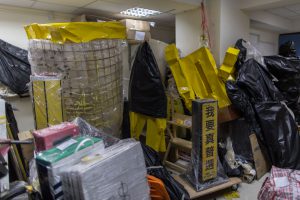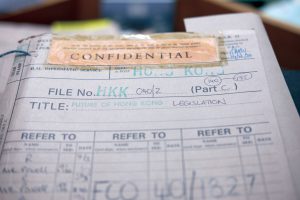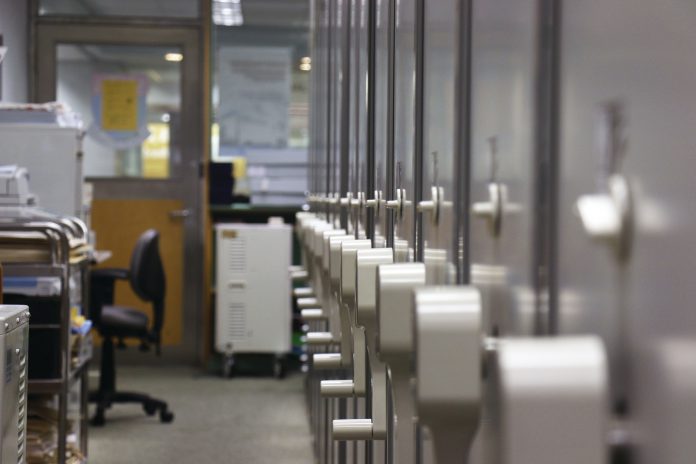Lack of archives law creates holes in historical records and gaps in government accountability
By Jade Li and Jasper Cao
On the nights before the police clearances of the occupied sites in Admiralty, Mongkok and Causeway Bay in 2014, volunteers raced to save the paintings, slogans, sculptures, banners and other “objects of demonstration” of the Umbrella Movement. This followed weeks of careful inventory making. After collecting the artefacts, the volunteers sent a number of them to the University Library of the Chinese University of Hong Kong for safe-keeping.

Sampson Wong Yu-hin, the founder of the Umbrella Movement Visual Archives and Research Collective, one of the groups involved in the rescue, says the activists were hesitant to send the objects to museums because they were worried that the administration may try to hide or eradicate the historical record.
“We trust the library because we think institutions doing academic research uphold integrity, unlike museums which are more manipulated by the government,” explains Wong.
While artists and cultural workers were concerned about the need to preserve and record the cultural artefacts from the movement, others drew attention to the need to have a record of the government’s decision-making process during Hong Kong’s most significant political movement in recent decades.
As Hong Kong does not have an archives law, the government is not obliged to preserve and maintain records. However, the then Chief Secretary Carrie Lam told legislators last year that, “the essential principles of records management adopted internationally have been implemented through administrative arrangements.”
Simon Chu Fook-keung, a former director of the Government Records Service (GRS), is not convinced. Chu, who helped found the Archives Action Group, has been campaigning for the enactment of an archives law for years.
Chu says that without legal constraints, the government can falsely claim that they do not have records. He cites the recent example of the “soft lobbying” for the controversial Wang Chau housing plan in which officials said there were no records of certain meetings.
For Chu, records should be widely defined to mean anything related to official duties that may be of archival value. This means they can be in any media format and are not restricted to paper documents and minutes of meetings. He thinks that under an archives law, communications by email or messaging applications such as Whatsapp and Telegram should also be preserved.
He raises the example of Education Secretary Eddie Ng Hak-kim, who sat in his car for 45 minutes after refusing to speak with protesters following a visit to a school in March last year. When Ng was criticised for “playing with his phone”, he said he had been discussing work matters with colleagues. Chu says electronic records would reveal the truth, but under the current situation we may never know because the government fails at the first step of record keeping, which is to create files for keeping.
Chu adds the rapid advances in technology present an extra challenge to official record keeping as the government does not have an up-to-date system for managing electronic documents. He says many of the departments still use a print-and-save method to store data and records.
Meanwhile, action to enact an archives law has been slow. In November 2011, then lawmaker Margaret Ng Ngoi-yee tried to move a motion on enacting an archives law in the Legislative Council but failed. The Law Reform Commission formed a subcommittee in 2013 to conduct studies on an archives law but there has been little progress.
Without such legislation, the GRS currently conducts archival work according to internal guidelines. After departments transfer their documents to the GRS, staff must decide whether the records are of potential archival value or not. The GRS is also tasked with formulating records management policy and reviewing record management practices in various departments, and drawing up records retention and disposal schedules.
However, the GRS has less authority than it sounds. Although departments and bureaus must get prior approval from the GRS director before destroying documents deemed to have no historical value, they also get to decide whether to transfer the records to the GRS in the first place.
In 2014, when Hong Kong experienced the Umbrella Movement and controversies such as the delay and soaring budget costs of the Guangzhou-Hong Kong Express Rail Link, the offices of the Chief Executive, Chief Secretary and the Financial Secretary transferred a total of 130 records to the GRS. This accounted for just 0.2 per cent of the records transferred from all government departments that year.
The volume of records destroyed is another cause for concern. GRS statistics show that an average of 58,643 linear metres (LM) of paper records were destroyed over the past five years. But in 2014 alone, 89,277 LM of records were destroyed, an unusually high number. Chu says it is impossible that so many records could have been properly screened in such a short time.
For him, a big part of the problem is a lack of professionalism. When Chu worked in the GRS, he received on-the-job and overseas professional archival training. He says officers in his time were encouraged to apply for recognition by the US Academy of Certified Archivists. But he says the GRS directors after his retirement in 2007 have not received comparable formal training in archival management or ethical codes. Instead of being specialists, his successors have been executive officers (EO) of the general grade.
“If the boss wants to destroy some records, a professional would bargain with him. But an EO won’t do that because they don’t have the knowledge and the vision. They don’t know what’s good or not. They always agree with their boss,” says Chu.

Stacey Belcher Lee, director of the University Archives of the University of Hong Kong, is a professional archivist and a member of the Archives Action Group. She says many Hong Kong people are not familiar with the idea of proper records management and that makes them hesitant to give archivists the authority to do their jobs properly. Lee says there is a mistaken belief that archivists want to save everything, when in fact appraisal is an important part of their work.
“They give the title archivist to people who are not professional to do the work. They have not caught up with the fact that somewhere along the line in the 20th century professionalisation and specialisation became the new world.”
Professional archivists strictly follow five standards in assessing records for retention – their legal, evidential, historical, intrinsic and emotional value. When it comes to the storm over HKU’s failure to appoint former law dean Johannes Chan as a pro- vice-chancellor, Lee says that regardless of the sensitivity of the episode, records were kept according to their compliance with archival standards and their authenticity.
Yet some records of great historical importance appear to have either vanished or be hidden. Veteran journalist Connie Lo Yan-wai encountered many difficulties making her documentary film about the leftist riots of 1967, Vanished Archives. The only visual record of the eight-month-long disturbances that could be found in the Public Records Office is a 21-second-long film which does not show any of the chaos of the time. Lo says a lot of information relating to the 1967 riots are missing although she could find many details of an earlier riot in 1956 and other events.
The film, which took four years to make, is filled with images of archival material obtained from other sources and interviews with people who experienced the events. She stresses the importance of verifying what the interviewees say and archives are essential to the process. Without any official government records, Lo had to resort to newspaper clippings and declassified documents from the National Archives in London, to piece together the events referred to by the protagonists.
As the colonial government created and preserved a large number of records according to the British archives law, the United Kingdom is a port of call for many Hong Kong scholars and journalists researching the history of Hong Kong.
Veteran journalist Gary Cheung Ka-wai made the journey and spent more than HK$15,000 to purchase copies of declassified documents on how the colonial government dealt with the leftists in order to write his book Hong Kong’s Watershed: The 1967 riots. Cheung thinks the GRS should buy the full set of archives on the riots from the UK so people can find references from history both now and in the future.
He cites the West Kowloon Palace Museum controversy earlier this year and wonders what communications there were between the departments in the Hong Kong administration and Beijing. If there were a 30-year rule for the documents to be declassified – as there is in the UK – those documents would be maintained and become accessible in the future.
“For journalists, the importance of records is when the truth is revealed after a number of years [when records are declassified],” says Cheung.
He points out this has implications for officials too as they may act with more humility and responsibility if they know their communications and decisions will be declassified one day. He argues that an archives law is important to keep those in government accountable.
Chan Kim-ching, a 32-year-old independent researcher working with the Liber Research Community, thinks declassified documents can tell us a lot about our current problems and predicaments. From studying documents in the British National Archives, he discovered the colonial government had decided to resume land in Wang Chau in the New Territories in the 1970s.

“Through a document, you can have a historical vision to review what has happened at this place,” he says.
Chan notes that what makes the preservation of such documents worthwhile is their ability to help us bring historical facts and perspectives into assessments of current issues.
The development of Wang Chau is just one of the many issues that he is looking into. With just 30 years to go before the end of the 50-year period during which China promised Hong Kong’s way of life would remain unchanged, Liber Research Community, political party Demosistō and a group of young scholars launched a comprehensive archival research project – Decoding Hong Kong’s History: Declassified Archival Research on the Future of Hong Kong earlier this year.
They aim to raise HK$500,000 through crowdfunding and hope to engage the public to reinitiate discussions about Hong Kong’s democratic development, post-2047 possibilities, and other matters related to the constitution and legal system.
Chan and others spent hours in the National Archives in London to look into hundreds of documents, such as records that referred to negotiations leading up to the Sino-British Joint Declaration. They found telegraph communications which suggested the British government had decided not to fight to maintain sovereignty over Hong Kong in 1982, long before the then Prime Minister Margaret Thatcher visited Beijing in 1984 after London failed to extend the lease on the New Territories in 1979.
In the long run, Chan and his partners want to build a database for these documents. They think this can help Hongkongers to create a community that belongs to them, based on a thorough understanding of the city’s history and colonial past.
“When you know about the history of a place, you will care about all aspects of it,” says Chan. “This is what we mean when we always talk about localism. Localism is everything to do with the place that you’re in.”
Edited by Karin Li














































